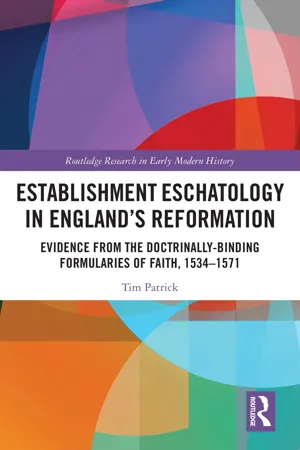
Establishment Eschatology in England's Reformation
Evidence from the Doctrinally-Binding Formularies of Faith, 1534–1571
- 178 pages
- English
- ePUB (mobile friendly)
- Available on iOS & Android
Establishment Eschatology in England's Reformation
Evidence from the Doctrinally-Binding Formularies of Faith, 1534–1571
About This Book
Exploring what the early English Protestants came to believe about the afterlife, and how they arrived at their positions, this much-needed book fills a gap in the scholarly literature. In surveying the authorised doctrinal works of the English church through the Reformation period, the progress of eschatological thinking is traced from the earliest days of change to the solidification of the formularies which remain binding across the worldwide Anglican Church today.
Fresh observations are made on some well-known texts such as the Books of Common Prayer, Articles of Religion and official Tudor homilies, and these are complemented by commentary on surprisingly understudied documents of the period including primers, catechisms, and the paratexts of the early printed English Bibles. The result is a fascinating study of the English reformers' navigation past both Roman Catholic and radical anabaptist beliefs, and it shows that their arrival at a relatively barren destination was due in part to a complete switch in theological priorities and in part to a fear of the implications of formally adopting some of the highly contested views.
Establishment Eschatology will prove to be an important resource for students and scholars of England's early modern religious and cultural history.
Frequently asked questions
Information
Table of contents
- Cover
- Half Title
- Series Page
- Title Page
- Copyright Page
- Table of Contents
- Acknowledgements
- Introduction
- 1 Doctrine for the Divines under Henry VIII and Edward VI: Articles of Religion
- 2 Protestantism for the People under Henry VIII and Edward VI: Bibles, Paraphrases, Homilies, Bidding Orders, Lectionaries, and the Books of Common Prayer
- 3 Private Protestantism under Henry VIII and Edward VI: Catechisms and Primers
- 4 Doctrine for the Divines under Elizabeth I: Articles of Religion, with a Note on the Act of Supremacy, the Injunctions, and the Canons
- 5 Protestantism for the People under Elizabeth I: Bishops’ Bible, Homilies, Book of Common Prayer, and Acts and Monuments
- 6 Private Protestantism under Elizabeth I: Catechisms and Primers
- Conclusions
- Index